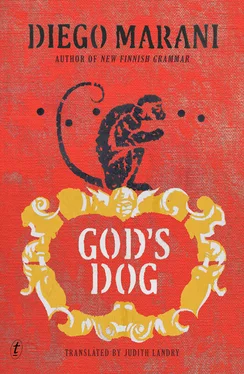Diego Marani - God's Dog
Здесь есть возможность читать онлайн «Diego Marani - God's Dog» весь текст электронной книги совершенно бесплатно (целиком полную версию без сокращений). В некоторых случаях можно слушать аудио, скачать через торрент в формате fb2 и присутствует краткое содержание. Год выпуска: 2014, Издательство: Text Publishing Australia, Жанр: Современная проза, на английском языке. Описание произведения, (предисловие) а так же отзывы посетителей доступны на портале библиотеки ЛибКат.
- Название:God's Dog
- Автор:
- Издательство:Text Publishing Australia
- Жанр:
- Год:2014
- ISBN:нет данных
- Рейтинг книги:4 / 5. Голосов: 1
-
Избранное:Добавить в избранное
- Отзывы:
-
Ваша оценка:
- 80
- 1
- 2
- 3
- 4
- 5
God's Dog: краткое содержание, описание и аннотация
Предлагаем к чтению аннотацию, описание, краткое содержание или предисловие (зависит от того, что написал сам автор книги «God's Dog»). Если вы не нашли необходимую информацию о книге — напишите в комментариях, мы постараемся отыскать её.
It is the eve of Pope Benedict XVIII's canonisation and Domingo Salazar, a Haitian orphan and now a Vatican secret agent, is hellbent on defeating the Angels of Death, pro-abortion and pro-euthanasia dissidents who are undermining the Pope's authority.
But as Salazar closes in on the cell he finds his life turned upside down. Suddenly it is Salazar and his closest friend Guntur who are under suspicion of sabotaging the administration. Their concept for a globalised religion called Bible-Koranism has upset the Church and they are in grave danger, as is Guntur's infamous Swahili-speaking chimpanzee Django.
God's Dog is a spoof on the absurdities of institutionalised religion that will delight aficionados of thrillers and detective novels as well as fans of Diego Marani
God's Dog — читать онлайн бесплатно полную книгу (весь текст) целиком
Ниже представлен текст книги, разбитый по страницам. Система сохранения места последней прочитанной страницы, позволяет с удобством читать онлайн бесплатно книгу «God's Dog», без необходимости каждый раз заново искать на чём Вы остановились. Поставьте закладку, и сможете в любой момент перейти на страницу, на которой закончили чтение.
Интервал:
Закладка:
II
He had looked for an internet point where he would not attract attention, and noted the cine cameras as he went in. There was an e-mail message from Guntur, with an address near San Basilio. Now Salazar got out of the train and started walking along the dismal streets. He found the block of flats, which was on a corner, separated from the street by a double row of rubbish bins. Torn, faded hangings fluttered from the balconies, and the few plant pots contained nothing but weeds; old tyres, rusty fridges, bicycles and other household goods were propped up against the railings, several of which had been torn out; the stakes of the nearby fencing were all twisted. The concrete of the pavement had been smashed into so much gravel; in front of the garages, the comings and goings of the cars had worn it away entirely, leaving a sea of mud. Salazar went up the poorly lit stairway, found the landing of flat 117 and knocked, as he had been instructed, though not before unbuttoning his jacket and ensuring his pistol was at the ready. He heard steps, sensed that he was being spied on through the peep hole. Then the key turned in the lock, and a squat, bearded man who could have been South American appeared on the threshold. He looked around him and gestured to Salazar to go in, then quickly kicked the door shut behind him. Salazar took a few steps across the grubby floor, smelled the bitter scent of cooked resin and knew that he had come to the right place. At the end of the corridor he glimpsed a room, lit by electric light, where several men were busying themselves around some gas rings. The man was barring his way. He took a foil-wrapped packet out of his pocket and held it out to Salazar, then put his hands on his hips, giving them a shake every now and again, as though they were wet. He lifted them to touch his nose, then put them down again, like a boxer before delivering a blow. Salazar lifted up a bit of foil, fingered the resin and sniffed his finger; from the scent, it seemed to be good quality Dutch. He wondered how on earth it had made its way to this Godforsaken spot. He nodded, and handed the South American a roll of banknotes he had counted out in advance. The man leafed through them with expert fingers and tucked them away inside his shirt. His hands still going like a pair of dumb-bells, he whacked the lock, opened the door and thrust the inspector unceremoniously out of it.
In Zurich, in March, there may still be snow on the ground, lying along the edges of the streets, blackened by exhaust fumes, or in patches of shade in meadows, quite unlike the dazzling, fluffy snow on the peaks behind the town, which is a balm for eyes wearied by the glass and iron of the cityscape. You have to go through the dark brown of the countryside and the dull sheet metal of the goods sheds along the motorway to get to it. In the evening it becomes tinged with pink, whipped up into plumes by gusts of wind and driven against the rocks, on which it falls in a fine dust. On just such an evening, at the crossroads between Seilergraben and Muhlergasse, a Mercedes roared off while the lights were still red and knocked down a man on a pedestrian crossing. The traffic drew to a halt, horns sounded, people got out of their cars to see if they could help the victim, but it was too late. Anyone witnessing the scene from the Zelenka Versichherung building would have seen the Mercedes driving at full tilt towards the station and then taking the Bahnh of brucke. The dead man was a forty-two-year-old Italian, the representative, in Switzerland, of a famous Milanese car firm. He was found to have been carrying a Glock 19, fitted with a silencer. The police started looking for witnesses on what was clearly a murder hunt. Someone had been quick enough to take down details from the number plate of the Mercedes, which turned out to have been stolen. It was found several days later in a parking lot just near the German border, with bloodstains on the front seat.
It was still early. The sun was beginning to warm up the damp air. Over the space of a few days, suburban lawns had turned a healthy shade of green, whose colour softened the grimness of the eastern outskirts. The puddles along the railway line reflected bright gashes of sky. The city, and the day, were emerging from the smoky darkness and suddenly seemed born anew. Even the graffiti-daubed carriages conveyed a sense of joy on that radiant morning. Salazar allowed himself to be rocked by the movement of the strangely empty train. He got out at the station for Saint Peter’s and walked to the basilica. It was two days before Easter, and the canonisation of Benedict XVI. The piazza had been cordoned off, and frenzied work was going ahead on erecting the podium from which the pope would greet the crowd after High Mass. A crane was hoisting the pieces of a giant crucifix on to a tubular construction which had been put up in front of the obelisk. Men in black were walking hurriedly up and down, talking quietly into minute microphones they wore around their necks; then they would place two fingers on the earphone, and slip it back inside their shirts. They would look up and signal to one another, unnoticed by the crowd amidst the other guards who were taking up their positions beneath the colonnade. A group of pilgrim friars from some Asian country were walking towards the square, led by a guide waving a yellow umbrella; they wore the grey habit of the missionary and the badge of the novice, and were careful to keep close to one another, their faces expressing reverence and awe. Endless rows of camper-vans were parked to either side of Via della Conciliazione, their roofs bristling with satellite aerials. Journalists and technicians were camping out en masse. The street was awash with cables, and the pavements were piled high with rolls of barbed wire which was to block access to the square. There was the sound of the odd trumpet. At the foot of the flight of steps, a squad of Swiss Guards, besieged by tourists clutching cameras, had gathered for a rehearsal of the forthcoming parade. Seeing their uniforms and halberds glistening in the sunlight, Salazar remembered the day he had sworn his oath. There had been the same light in the piazza, the same pink colour on the façade of the basilica. It had rained during the night, and the paving was still gleaming and clean-smelling. The procession of officers had come marching out of the Porta Angelica and lined up in four rows below the platform to the sound of a drum roll. The inspector had been beside himself with emotion, looking towards the throng of other people’s relatives behind the barriers with tears in his eyes. He himself had no one to wave to, no one to walk with through the streets of Rome after the ceremony, proudly clad in his dress uniform. When he thought of his parents, he would remember those of his fellow students, glimpsed in framed photographs on bedside-tables in the dormitory, photographs he himself had never had the opportunity of taking. He thought of the rubble in Haiti, the sirens sounding, people wailing, bloodied and white with dust. At such moments he would stare skywards and wonder why things had to be as they were. The new prior had come from Bologna for the ceremony. Salazar scarcely knew him, he had left the patriarchal monastery before the new prior had arrived. But he was pleased to be greeted by his old teachers, and the odd companion who had remained in the city garrison. Going into the basilica with them to hear mass, he felt that that church was his home, and that everyone there recognised him and greeted him, Domingo Salazar, the Haitian orphan who had become an officer in the papal guard. Suddenly he felt that the hard times were over, and that the rest of his life would be one glorious march. He would continue to make his leaders proud of him, and serve in the great army of the Church as it progressed from victory to victory. His first enquiries, into the kidnapping of the president of the Bishops’ Conference which his division had succeeded in foiling, gave him enormous satisfaction. Cardinal Antonelli had been targeted by an anti-papist group because of his reforms to the school syllabus. The new law forbade the teaching of Darwinism, and introduced creationism into the curriculum for the first time. Together with blasphemy, thanks to Antonelli’s law Darwinism too had become a crime. Anyone advocating the ideas of the fanatical Englishman might be hauled up before the courts. The first negative verdicts were not long in coming, and many secular-minded teachers left the profession. The terrorists belonging to the group known as ‘God is dead’, who had been threatening Antonelli for some time, had at last managed to get him in their sights. The attack was to take place in the morning, when as always he left for the ministry after mass in the Church of San Francesco a Ripa. One group would be waiting for him with a bogus ambulance, while others would block the access roads. The terrorists were planning a kidnap which would mortify the curia. But the papal police had infiltrated the group and managed to intercept their communications. The morning of the kidnap, the area was bristling with plainclothes policemen, Salazar among them, and it was his company which surrounded the terrorists. The man who came out of the church wearing a cardinal’s robes was not Antonelli, but a policeman; the real cardinal had stayed behind in safety in the sacristy. When the ambulance moved off in the prelate’s direction, it was immediately attacked and boarded by the papal police, who immobilised the bogus nurses. The anti-papist network was completely broken up and the whole of the fourth police district was awarded a medal for valour. Salazar’s commanding officer took a shine to his new recruit and commended him to the secret services. Over the years that followed, Salazar had specialised in Catholic propaganda and was sent abroad, first to Beirut, then to Amsterdam, his second posting, where his cover was that he was mustering the Dutch Catholics. His real work, however, lay elsewhere: he was to sabotage the secular state, spread distrust in science, intercept the anti-papist refugees from Italy and keep them under surveillance. A flock of pigeons, swooping down on some maize scattered at the friars’ feet, distracted him from his thoughts. For a moment, Salazar had felt an upsurge of the enthusiasm of those early years. What had changed in the meantime? He now thought back to his youthful naivete with some surprise; and yet, protected by such innocence, he had been happy. Now his main emotion was one of bitterness at no longer knowing what was right. He was a warrior in the service of the Church, but he was surrounded by incompetence, indifference and pettiness, by men who sought only their own personal advantage. Perhaps, indeed, it was just a matter of age. He thought of the Vicar, and wondered if he were beginning to resemble him: was he too becoming a dinosaur, self-important, lacking all sensitivity and intuition? If so, that was a tendency that had to be fought against at all costs: he must never lose sight of the supreme aim of all he did, namely the triumph of faith. He had to remain a hound of God, a steadfast warrior in his chosen war; he owed this to the Church which had saved him, to the men who had given him his faith. Picking his way among the pigeons, he went into a bar, bought two metro tickets and went off towards Ponte Vittorio Emanuele. Once back in his room, he drew the shutters closed against the sun, already high in the sky, turned the key in the lock and smoked a whole pipeful of what was indeed an excellent Nether Dope.
Читать дальшеИнтервал:
Закладка:
Похожие книги на «God's Dog»
Представляем Вашему вниманию похожие книги на «God's Dog» списком для выбора. Мы отобрали схожую по названию и смыслу литературу в надежде предоставить читателям больше вариантов отыскать новые, интересные, ещё непрочитанные произведения.
Обсуждение, отзывы о книге «God's Dog» и просто собственные мнения читателей. Оставьте ваши комментарии, напишите, что Вы думаете о произведении, его смысле или главных героях. Укажите что конкретно понравилось, а что нет, и почему Вы так считаете.












